Ready to learn more?
Get all the details straight to your inbox!

Living in The Student Village at Luther College, our student residence, comes with a choice of healthy, nutritious meal plans. That means no grocery shopping, no meals to cook, and no dirty dishes to worry about. You can focus on your studies and wellness!
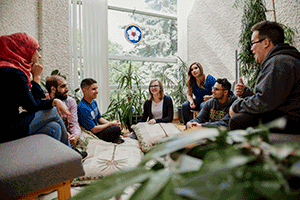
Luther College appeals to students who want to study in a safe, nurturing, and inclusive environment. We welcome students of all faiths, ethnicities, backgrounds, religions, genders, and sexual orientations.
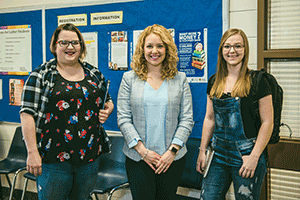
The priority deadline for academic application is March 15. To book a personalized enrolment counselling appointment, contact our Recruitment Office at 1-306-206-2117.

Luther students can register in Arts, Science, or Media, Art, and Performance. Luther students are U of R students and receive a U of R degree.
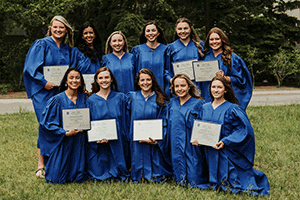
Luther College students are U of R students and receive all the same benefits. Upon graduation you will receive a U of R degree.
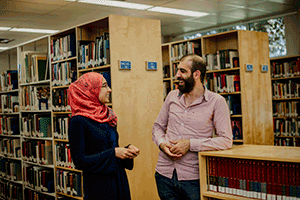
The Luther Library has over 24,000 items in its collection, 5,000 books checked out per year, and 7,000 students who come through its door per month.

Our student residence, The Student Village at Luther College, welcomes residents from ALL post-secondary institutions in Regina. Rooms come with a meal plan, free laundry, free wi-fi, and a great sense of community.
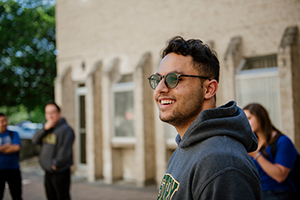
Every degree program at Luther College offers a study abroad option and an optional experiential learning component where you gain real world experience and get paid while going to school!
Get all the details straight to your inbox!
HYFLX An introductory level course covering the principles of biology with examples taken from humans. * Note: This course is designed to apply the study of biological principles to humans. Biology majors cannot take this course for credit. Students cannot receive credit for both BIOL 140 and 150. Students who have credit for either BIOL 100 or BIOL 101 cannot subsequently receive credit for either of BIOL 140 or BIOL 150.* Plus one lab section L02, L03, or L04. Labs will begin the week of January 25 and 26.
Bi-weekly lab beginning January 25 and 26.
Bi-weekly lab beginning January 25 and 26.
Bi-weekly lab beginning January 25 and 26.
This course and Lab L07 are taught in French. An introductory level course covering the principles of biology with examples taken from humans. * Note: This course is designed to apply the study of biological principles to humans. Biology majors cannot take this course for credit. Students cannot receive credit for both BIOL 140 and 150. Students who have credit for either BIOL 100 or BIOL 101 cannot subsequently receive credit for either of BIOL 140 or BIOL 150.* Plus one lab section L02, L03, or L04.
This lab is taught in French.
ONLINE DELIVERED COURSE An introductory level course covering the principles of biology with examples taken from humans. * Note: This course is designed to apply the study of biological principles to humans. Biology majors cannot take this course for credit. Students cannot receive credit for both BIOL 140 and 150. Students who have credit for either BIOL 100 or BIOL 101 cannot subsequently receive credit for either of BIOL 140 or BIOL 150.* Plus one lab section L02, L03, or L04.
ONLINE DELIVERED COURSE Lab
The intent of this course is to provide a basic introduction to pathogens and the concept of diseases. This course covers bacteria, viruses and eukaryotes, with emphasis on emergent diseases and urgent challenges for public health. ***Prerequisite: BIOL 100 and BIOL 101*** *Note: Students who have received credit for BIOL 303 may not subsequently receive credit for BIOL 224.*
Lab. Biweekly beginning January 15
Lab. Biweekly beginning January 15
Lab. Biweekly beginning on January 15
Lab. Biweekly beginning January 15
Aetiology, pathogenesis, diagnosis, treatment and epidemiology of infectious diseases of humans, caused by bacterial, viral, fungal and parasitic organisms. ***Prerequisites: BIOL 224 and 288***
Research
This course develops students' proficiency in critical reading and writing through the study of a wide range of non-literary and literary texts, and the study of composition, with emphasis on connections between modes of reading and writing. *Note: Students who are planning to repeat ENGL 100 should seek academic advising before doing so*
TOPIC: Transgressive Fiction. Hyflex- online/onsite flexible Instructional Method. A study of a special topic in literature, which may include non-literary texts, in conjunction with a continuation of the writing program begun in ENGL 100. ***Prerequisite: ENGL 100.*** *Note: Every section of ENGL 110 has a different focus. Please consult the Department's Supplementary Calendar or the list of current course offerings on the Departmental website.* *Note: Students who fail ENGL 110 twice should contact their faculty or their federated college immediately.*
TOPIC: Literature of Winter. A study of a special topic in literature, which may include non-literary texts, in conjunction with a continuation of the writing program begun in ENGL 100. ***Prerequisite: ENGL 100.*** *Note: Every section of ENGL 110 has a different focus. Please consult the Department's Supplementary Calendar or the list of current course offerings on the Departmental website.* *Note: Students who fail ENGL 110 twice should contact their faculty or their federated college immediately.*
TOPIC: Children's Fantasy Literature. A study of a special topic in literature, which may include non-literary texts, in conjunction with a continuation of the writing program begun in ENGL 100. ***Prerequisite: ENGL 100.*** *Note: Every section of ENGL 110 has a different focus. Please consult the Department's Supplementary Calendar or the list of current course offerings on the Departmental website.* *Note: Students who fail ENGL 110 twice should contact their faculty or their federated college immediately.*
TOPIC: Engineering Souls: Biology, Technology, and Humanity. A study of a special topic in literature, which may include non-literary texts, in conjunction with a continuation of the writing program begun in ENGL 100. ***Prerequisite: ENGL 100.*** *Note: Every section of ENGL 110 has a different focus. Please consult the Department's Supplementary Calendar or the list of current course offerings on the Departmental website.* *Note: Students who fail ENGL 110 twice should contact their faculty or their federated college immediately.*
The craft of creative writing, with work in poetry, drama or non-fiction, and prose fiction. ***Prerequisite: ENGL 100 and either ENGL 110 or ENGL 152.***
REMOTE - synchronous Instructional Method. An examination of several well-known books for children, focusing on human relations with the natural world. ***Prerequisite: ENGL 100 and either ENGL 110 or completion of 48 credit hours.***
Explanation of human placement in and interaction with the natural environment; assessment of concepts, processes, and patterns as related to distribution of human phenomena, including economic activity and settlement types. *Note: Students may receive credit for only one of GES 120, GEOG 120, or GEOG 220.*
Employing multiple analytical approaches, this course examines the economic, social, cultural, and environmental factors and processes of recreation and tourism, and their implications on the environment, space, and place, at a variety of geographical and temporal scales. ***Prerequisite: GES 100 or GES 120, or permission of the Department Head.*** *Note: Students may receive credit for only one of GES 232, GEOG 232, or GEOG 332.*
This course explores the influence of the past on the world in which we live. Topics addressed will be taken from today’s headlines and will reflect a wide variety of periods and geographical areas. Topics may include terrorism, environmentalism, war, demonstrations, popular culture, the welfare state, global crises.
This course explores the depth and breadth of cultural identities, exchanges and interactions in Europe in the sixteenth and seventeenth centuries. It will examine the role of religion, ethnicity, race and class in shaping early modern identities and informing cultural interactions during this period of violent upheaval and change. ***Prerequisite: One HIST course or completion of 30 credit hours***
An introductory class in the theory and techniques of differentiation and integration of algebraic and trigonometric functions. Topics include limits, optimization, curve sketching, and areas. ***Prerequisite: Precalculus 30 with at least 75%, or Calculus 30 or Mathematics B30 and C30 with a grade of at least 65% in each or Math 102*** *Note: Students can receive credit for only one of MATH 103 or 110*
Labs will Start the week of January 15.
Differentiation and integration of exponential and logarithmic functions; methods of integration and applications; indeterminate forms, L'Hospital's rule and improper integrals; sequences, series, power series and Taylor series. ***Prerequisite: MATH 110, or MATH 103 with a grade of at least 80%***
Labs start the week of January 15.
A course intended to introduce students to elementary linear algebra, particularly at a computational and applied level. Topics include matrices and systems of equations, inversion, determinants, vectors, inner products, eigenvectors and eigenvalues. ***Prerequisite: Precalculus 30, Mathematics B30 and C30, or Math 102.***
Labs start the week of January 15.
A study of vector functions and functions of several variables and their derivatives; Applied maximum and minimum problems, Lagrange multipliers, multiple integration, integration in polar, cylindrical and spherical coordinates; Green's, Stokes' and the Divergence Theorem. ***Prerequisite: MATH 111 and 122***
Labs start the week of January 15.
Ordinary differential equations, modelling with differential equations, Laplace transforms. ***Prerequisite: MATH 111 and MATH 122***
Least squares and other approximations. Difference equations. Solutions of algebraic systems. Symbol manipulators. ***Prerequisite: MATH 213 and either MATH 261 or CS 261.***
This course traces the development of important early musical styles, genres, and forms by placing representative composers and selected musical works into their appropriate socio-cultural and historical contexts. Emphasis is on students honing their listening, writing, research and presentation skills. ***Prerequisite: MUHI 202 or permission of Department Head*** *Note: Students cannot receive credit for both MU 203 and MUHI 203*
This course examines the centuries-old tradition of opera through the stories it tells. Students will also explore how operas were understood at the time of their creation and examine how the operatic experience has changed over time. *Note: MUHI 202 or MU 100 are recommended*
Graduate course
ONLINE. An introduction to the nonprofit and voluntary sector in Canada and the organizations that comprise it. The course examines the history, size, scope, and roles of the sector in society, relationships with government and other sectors and accountability in the context of governing and managing a private not-for-profit corporation. *Note: Formerly numbered IDS 290AA and NSLI 200. Students may receive credit for only one of NSLI 100, IDS 290AA or NSLI 200.*
ONLINE. Will cover the fundamentals and challenges of fundraising and resource development in non-profit and voluntary sector organizations. Topics covered will include working through the donor cycle, the importance of relationship building, establishing revenue streams, grant-writing, and the role of the Board and governance for organizational sustainability. ***Prerequisite: NSLI 100 or 12 credit hours, or permission of the Program Director.*** *Note: NSLI 100 may be taken concurrently.* *Note: Students may receive credit for one of NSLI 390AB or NSLI 370.*
REMOTE SYNCHRONOUS. Theoretical and practical consideration of nonprofit advocacy work, including power structures and systems, government structures, community development and organizing, and networking and engaging community residents to achieve changes in public policies and programs and to educate about societal problems. Legal restrictions on charities' advocacy are examined. ***Prerequisite: NSLI 100 or 12 credit hours, or permission of the Program Director.*** *Note: NSLI 100 may be taken concurrently.* *Note: Students may receive credit for one of NSLI 220, NSLI 320, IDS 290AE, or JS 384.*
This introduction to philosophy will explore how philosophy can provide answers to some of the more profound questions we face, such as questions concerning knowledge, truth, mind and body, personal identity, free will, morality, politics, reasoning and the existence of God. * Note: Topics will vary with sections of this course *
An introduction to the systematic study of reasoning, this course will teach the theory and practice of good reasoning. It will provide students with reasoning skills that are useful in whichever discipline and career they may pursue.
HYFLEX-online/onsite flexible Instructional Method. This course critically examines sustainable development from a philosophical perspective clarifying its various meanings, coherence, and implications. Underlying principles (such as the precautionary principle), relationship to other concepts (such as sustainable growth), and implied ethical obligations are explored. The merits of different sustainable development strategies are philosophically examined. ***Prerequisite: PHIL 100 or completion of 15 credit hours.*** *Note: Students may receive credit for one of PHIL 282 or PHIL 290AF.*
HYFLEX-online/onsite flexible Instructional Method. An introduction to the study of brain and behaviour, perception, learning, memory, cognition, motivation and emotion.
HYFLEX-online/onsite flexible Instructional Method. An introduction to biological, cognitive, and social aspects of psychological development across the lifespan. ***Prerequisite: PSYC 101 and PSYC 102.***
ONLINE. An overview of the field of forensic psychology – the intersection of psychology and the law. Topics include: psychology of police investigations, deception, eyewitness testimony, child victims and witnesses, juries, mental illness in court, sentencing and parole, domestic violence, sexual offenders, psychopathy, risk assessment, and special offender populations. ***Prerequisite: Completion of 60 credit hours including PSYC 101 and PSYC 102. Declared Justice Studies majors may enroll with completion of 60 credit hours including PSYC 101 or PSYC 102.*** *Note: Students may receive credit for one of PSYC 321 or PSYC 320 as a forensic course.* *Note: This course will initially be restricted to PSYC majors. Non-majors will be eligible to register at a later point if space remains.*
An examination of the major theories, research methodologies, and data in the field of the psychology of women. Philosophical values of feminism and the psychological impact of women's historical roles in society, and cultural perspectives pertaining to women will be considered throughout. ***Prerequisite: PSYC 101, 102, and two 200 level courses in the social sciences, or permission of the instructor***
This course will include historical and philosophical foundations of positive psychology while reviewing related disciplines and discussing their contributions to the field. Some areas of focus will be: well-being, virtues, values, strengths, self-actualization, love and friendships, resilience, positive affect, optimism and hope, gratitude, lifespan, and organizations. ***Prerequisite: PSYC 101 and PSYC 102.*** *Note: This course will initially be restricted to PSYC majors. Non-majors will be eligible to register at a later point if space remains.*
A research thesis in psychology. **Permission of the Department Head is required to register.** *Note: This course will initially be restricted to PSYC majors. Non-majors will be eligible to register at a later point if space remains.*
An examination of selected topics in developmental psychology with reference to recent theoretical and experimental advances. ***Clinical MA students must receive permission of the Director of Clinical Training to register.***
Thesis research.
Thesis research.
ONLINE. An overview of the field of forensic psychology – the intersection of psychology and the law. Topics include: psychology of police investigations, deception, eyewitness testimony, child victims and witnesses, juries, mental illness in court, sentencing and parole, domestic violence, sexual offenders, psychopathy, risk assessment, and special offender populations. ***Prerequisite: Completion of 60 credit hours including PSYC 101 and PSYC 102. Declared Justice Studies majors may enroll with completion of 60 credit hours including PSYC 101 or PSYC 102.*** *Note: Students may receive credit for one of PSYC 321 or PSYC 320 as a forensic course.* *Note: This course will initially be restricted to PSYC majors. Non-majors will be eligible to register at a later point if space remains.*
Graduate course
HYBRID-onsite classroom Instructional Method. An introduction to the academic study of religion; a survey of the thought and practices of major world religions; the impact of religion on society and culture.
REMOTE HYBRID-remote Instructional Method. An introduction to the academic study of religion; a survey of the thought and practices of major world religions; the impact of religion on society and culture.
ONLINE. An introduction to the foundations of Christianity dealing with topics such as the centrality of the story of Jesus, its roots in Judaism, its sources of authority, characteristic practices, historical and theological development, major denominational families. Some contemporary issues may also be briefly outlined. ***Prerequisite: Completion of 12 credit hours or RLST 100.***
A survey of the various books of the Hebrew Bible (Old Testament or Tanakh) from historical, literary, and theological perspectives. ***Prerequisite: Completion of 12 credit hours or RLST 100.***
This course explores the Muslim encounter with the modern age. It examines the traditional religious stance of the Islamic community, and the significant movements and influences that have affected it. It studies specific problems faced and decisions taken, and analyzes adaptations and tensions in Islamic faith and life resulting from the encounter. ***Prerequisite: Completion of 24 credit hours or a 200 level RLST course.***
REMOTE- synchronous Instructional Method. The notion of religious literacy within the constructs of Canadian secularism and multiculturalism is examined historically and with comprehensive conversations regarding models of interreligious dialogue, advocacy and atheism, feminist responses, and covering the most current topics, e.g. accommodation principles, educational responsibilities, the role of Islamophobia, public space and prayer, and more. ***Prerequisite: Completion of 24 credit hours or a 200 level RLST course.***
Graduate Thesis Research
This is a zero-cost materials course. An introduction to statistical methods; descriptive statistics; the normal distribution; basic techniques of statistical inference; confidence intervals and hypothesis tests for population means and proportions; simple linear regression; and one-way analysis of variance. ***Prerequisite: Foundations of Math 20 or Precalculus 20 or Apprenticeship & Workplace Math 30 or MATH A30 or AMTH 091 or MATH 101*** *Note: STAT 100 and STAT 200 are designed to provide a year-long introduction to statistical methodology with a view towards applications and are not intended for majors in statistics, actuarial science, or any other program requiring a detailed knowledge of statistics. Students who receive credit for STAT 100 may not receive credit for STAT 160*
A continuation of STAT 100; inference for two categorical variables; basic multiple linear regression; two-way analysis of variance; introduction to nonparametric methods; statistical process control; introduction to survey design. ***Prerequisite: STAT 100*** *Note: STAT 100 and STAT 200 are designed to provide a year-long introduction to statistical methodology with a view towards applications and are not intended for majors in statistics, actuarial science, or any other program requiring a detailed knowledge of statistics. Students who receive credit for STAT 200 may not receive credit for STAT 160*
REMOTE-synchronous Instructional Method. Why are Indigenous women throughout the world more likely to "go missing"? This class will examine systems that intersect and perpetuate racism and colonialism, sexism and poverty, and the effects of globalization on the breakdown of family structures. Expertise and voices from community activists will be integral to this class. ***Prerequisite: WGST 100 or permission of the Department Head.*** *Note: Students may receive credit for one of WGST 300 or WGST 390AF.*